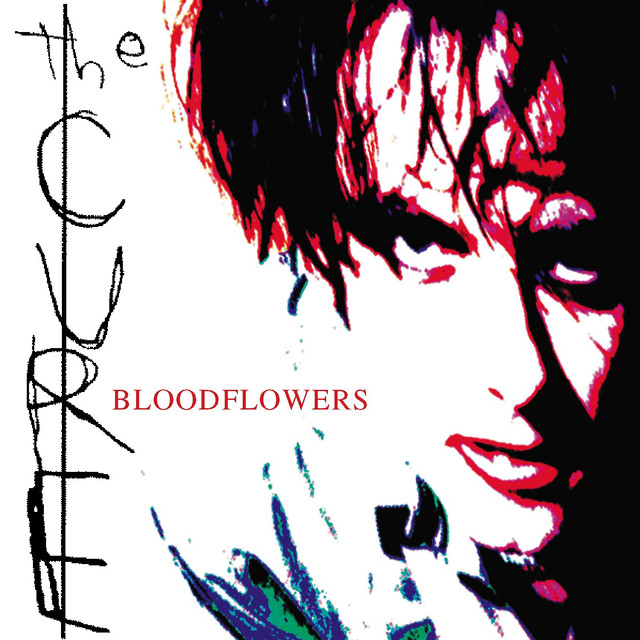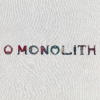“I…knew the album was going to be nostalgic and wistful, because I was writing words that summed up how I was feeling heading towards becoming a 40-year-old,” Robert Smith told Guitar Player in 2000. “That set the tone for what I wanted to do musically, but I wasn’t sure how I was going to achieve it.”
Released on Valentine’s Day at the turn of the millennium, when the bug has just failed to destroy civilization as we knew it, was The Cure’s 11th studio album, Bloodflowers. It was billed as the third in a trilogy that started with the nightmarish despair of Pornography and was then expanded in scope and sound on the wistful Distingeration. Whilst there are thematic similarities with these two records the passing of time, the existential despair, and the finality of everything, Bloodflowers is more of a temperamental beast. It’s not a post-punk album, it’s not a pop album, it’s a Cure album. A record that submerges itself into the foreboding of upcoming middle age. Whilst it doesn’t attain the classic level promised by Robert Smith of the other two records in the trilogy, it’s still underrated: it’s the last Cure album I loved until now, and despite the pretty awful cover art (it looks like it was made in thirty minutes on Paint), for me, it’s a latter career highlight.
In the wake of a eight month legal battle with Lol Tolhurst over the rights to The Cure’s name, by the end of which Tolhurst had lost everything, Robert Smith was worn out and the songs intended for The Cure’s 10th studio album, 1996’s Wild Mood Swings were left unfinished, The Cure had no drummer. The departed Boris Williams was eventually replaced Jason Cooper by the time of Wild Mood Swings’ release. But with that records poppy melodies and offbeat leanings, The Cure were out of step with the trends of the mid 90’s era.
“In the UK, Britpop did kill us,” admitted Smith in Uncut “For the first time, the NME and Melody Maker were right in their view of how the public perceived us. It was the first album in The Cure’s history that didn’t do better than the last one, but it still sold over a million copies and in anyone’s terms that was pretty good.”
Booked into the same arenas they’d filled for Wish tour, The Cure found themselves playing to half-full venues plugging a record that hadn’t sold as well. After a decade on an upwards curve, many bands would have split, or taken a break. Instead, on the cusp of 40 years of age Robert Smith and his cohorts bunkered down and eventually produced the sprawling 60 minutes of Bloodflowers that retooled The Cure sound for the 2000s. Whilst deeply indebted to fragments of their past both musically and lyrically, produced by Smith himself and engineer Paul Corkett (ABC, The Chameleons, Placebo) and recorded at RAK Studios in London and St Catherine’s court in Bath, but this is perhaps the most American sounding record they had made up to this point.
Dipped in wistfulness and passing, this reflective album is a slow burner. As influenced by their past as the bands they had help inspire, it mirrors an alternative sound of the era building walls of guitars and loops that at times seem endless. There is a recognition of the expansive sounds of groups like Mogwai, and the industrial grit and edge of NIN, maybe even a touch of the grunge-meets-gaze of early Smashing Pumpkins. This was Smith and his band digging in and uncovering what it means to be in the Cure in 2000s. Maybe that’s what dates its sound, but also what makes it stand out in their latter run of records.The songs on Bloodflowers may meander, they’re long, at times very long, perhaps too long, sometimes they sound like they are worryingly near retread, but there’s a crumpled heart that overcomes these fears, mostly. But this is also a record that tenderly lingers on the point, wallows deep in oceans of melancholia and looks to the future with trepidation.
“This is one of three classic Cure albums,” Robert Smith told James Oldham in an Uncut magazine interview. “I accept now that The Cure have a sound, and this album is the sound of The Cure. The difference is, now I like the idea, I like the fact that you know it’s The Cure within 30 seconds of it starting. It’s a testament to what we’ve achieved.”
On the tremendous first track, ‘Out of this World’ opens like a flower: looping acoustic bar chords build towering walls, percussion swoops and twinkles, organs wooze, and Gallup’s basslines swoop, it sounds spacious, with layer upon layer, and tees you up for what’s to follow. Smith sounds both wistful and resigned as he muses on fading memory and the fleeting passing of time, “Always have to go back to real lives, were we belong.” He offers. Watching goodbyes in slow-motion, the good and the bad of the past and how we ground ourselves with home and the long standing relationships we forge. He’s also asking, where do I go from here? Is this the end? Well, most Cure albums stare at the end, including their classic record, Disintegration. Some argued, perhaps unfairly, that Bloodflowers is nine songs that attempt to rewrite ‘Pictures Of You’ less successfully. Whilst that may be unfair, you can see the parallels here.
“The first time I heard Young Team [Mogwai’s 1997 debut], I thought I’d really like to do something that’s got this power in it. I think Mogwai are quite openly indebted to what The Cure have done over the years and I’m indebted to them for reawakening the idea of what you can do if you take a simple idea to an extreme.”
“And the night is never over and over and over and over and over/ And then it’s gone” sneers Smith on the lacerating ‘Watching Me Fall’ his trademark growl punctuating this powerful slab of oscillating cinematic introspection, with pummeling drums and caustic guitars that echoes elements the rage and nihilism of Pornography. Also appearing on the soundtrack for the American Psycho film, this is the sound of everything falling apart. Less of a verse-chorus-verse structure, this is a pummelling, tumbling through the howling twilight and into finality.
‘Where the Birds Always Sing’ is one of the most melodic moments here, percussion lumbers and guitars scowl as Smith charmingly considers another world another place, an escape, where living things exist forever. It is quite a flip given the finality we have been faced with up to now. ‘Maybe Someday’ sounds like classic Cure, the spinning percussion garnished with pianos and Smith delivers longing words as he sounds like a man holding onto that last shred of hope as it slips through his hands.
Perhaps the best moment here is ‘The Last Day of Summer’. They even played it again when I saw them in concert at the tail end of last year, showing that it has still endured the twenty odd years since its release. Smith has never sounded so resigned, the sound of a man staring at the sunset and watching it go down as he whispers to the heavens. Reflecting on how when he was young it all seemed so easy and now it’s become all so hard entwined with the keening metaphorical visual of the setting sun. “the last day of summer/Never felt so cold/The last day of summer Never felt so old” he offers as spindly fuzz-trailed guitars spiral overhead. It’s a shrug of the shoulders as all hope and love is extinguished. Dipped in melancholia yet achingly beautiful and draped in strings like the embers of the sun rays, this is the trick The Cure can pull off.
“Half my life I’ve been here/ Half my life in flames/ Using all I ever had/ To keep the fire ablaze,” Smith confesses on ’39’, perhaps wrestling with the struggle of being the artistic driving force of The Cure, from their early days in Crawley as a three piece, through their various incarnations each one driven by Smith’s unique voice, trademark songwriting, words that are both intensely personal and poetic and very particular vision. This is a record concerned with numbers, dates, ageing. If commercial success had left them, the creative fires still burned. It also echoes Disintegration’s ‘Closedown‘ with its introspective judgement and obsession with time running out. It’s also the sound of a man running out of ideas and is tired of going over old ground (“I’ve run right out of thoughts and I’ve run right out of words/ As I used them up, I used them up.”). It is no wonder some speculated that this was their finale.
‘There Is No If…’ meanwhile is positively tender, it feels like it could be dedicated to Smith’s long time wife and teenage sweetheart, Mary Poole. The album’s closer and title track tumbles through cavernous drums into a conversation with permanence, and the chiming backdrops lending an epicness to this sprawl. Smith sounds worn out but there’s also a clear eyed reflection on the future as he disappears down a hole surrounded by swirling clouds of guitar. Is this the end? We can’t halt the relentless passing of nature and time, but what remains and what endures when we are gone?
“This world never stops,” you said
“This wonder never leaves
The time will never come to say goodbye
This tide never turns,” you said
“This night never falls again
These flowers will never die”
Critics speculated Bloodflowers would be the last Cure album, something they’ve hinted at over and over throughout their career. Upon release the Melody Maker’s Mark Beaumont, perhaps harshly, dubbed Bloodflowers “Goth Awful” and claimed it “turns up, sounds like the Cure for an hour, congratulates itself on a job mundanely done and f**ks off down the pub “ and they were hit with mixed reviews. Even today it’s a record maligned in the Cure community. I listened to an American Cure fan podcast that slammed much of the record and sure it’s meandering at times, and yes, perhaps compared to the other two parts of its trilogy it pales slightly in comparison to those classics. Sure, you can criticise the running time, the lack of dynamism and knockout melodies in places compared to their commercial peaks, and at times you wonder if there’s a touch of writer’s block here, and unlike their classic albums it’s a record that is linked inextricably with the sounds and uncertain feeling of the early 00s.
But set your preconceptions aside because Bloodflowers is a record that can envelop you. Robert Smith is at his most reflective. It’s one of his most honest records and the heart is left uncovered. Smith isn’t trying to please us, he isn’t trying to get a hit, in that way it’s refreshing. In a worn out state, he’s trying to open up a dialogue, rekindle his fire and gifting us his heartfelt self-awareness on how he has lived half his life trying to do some of these things and sometimes, like all human beings, it has sometimes succeeded and sometimes failed, but its the journey, the relationships you forge and the art you make that stands the test of time, when you are gone. Bloodflowers is the sound of things falling apart and being rebuilt in another more honest image and despite its flaws, I love it for that.




